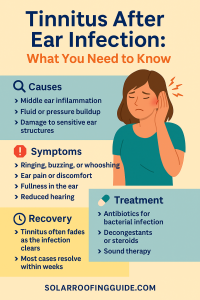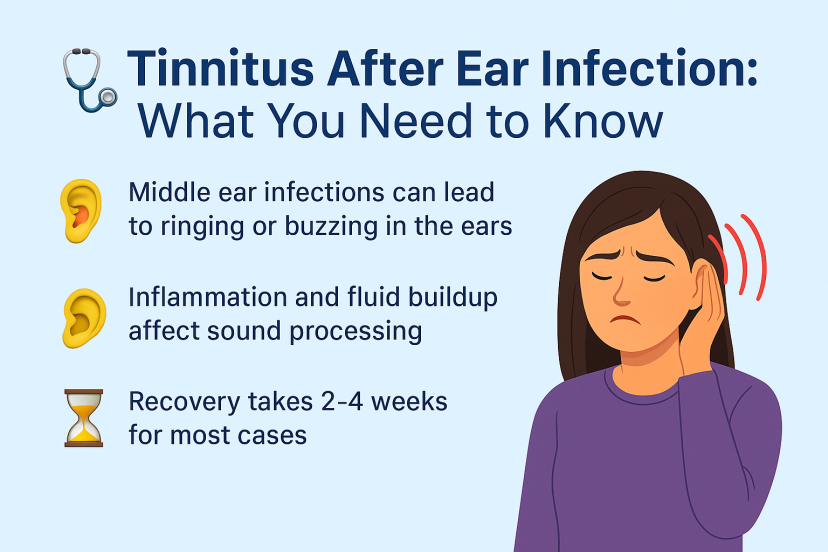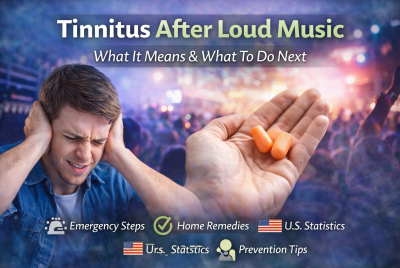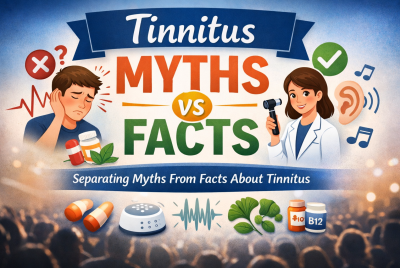Tinnitus After Ear Infection: What You Need to Know
🔊 What Happens When Ringing Ears Follow an Ear Infection
You’ve just recovered from an ear infection — the pain is gone, the pressure has eased — but now there’s a new problem: a constant ringing, buzzing, or humming sound that won’t go away.
This lingering noise, known as tinnitus after ear infection, can be frustrating and worrying. The good news is that post-infection tinnitus is often temporary and improves as your ear fully heals. However, understanding why it happens and how to manage it can make a big difference in your recovery.
This guide explains the connection between tinnitus and ear infections, the medical reasons behind it, effective treatments, and how long it usually takes to fade.
🦻 Understanding the Link Between Ear Infections and Tinnitus
🦠 What Causes Tinnitus After an Ear Infection?
When your middle ear (the area behind your eardrum) gets infected — usually by bacteria or viruses — it leads to inflammation, fluid buildup, and pressure changes. These changes can temporarily affect how sound waves are processed, causing ringing or muffled hearing.
Common reasons include:
-
Middle ear infection (Otitis media): Fluid and swelling interfere with sound transmission.
-
Inner ear inflammation (Labyrinthitis): Affects both balance and hearing, often with dizziness.
-
Antibiotic side effects: Some medications used to treat ear infections can be ototoxic, meaning they may irritate or damage inner ear cells.
-
Residual congestion: Even after the infection clears, trapped fluid or pressure can still affect the eardrum.
In most cases, this tinnitus is a byproduct of inflammation and temporary damage — not permanent hearing loss.
⚙️ How Ear Infections Affect Hearing and Balance
The middle ear is responsible for transmitting sound from the outer ear to the inner ear. When infected:
-
The Eustachian tube (which balances ear pressure) can get blocked.
-
Fluid accumulation dampens sound vibrations.
-
Swelling puts pressure on the auditory nerve, leading to tinnitus sensations.
Once the infection resolves, these symptoms typically subside — but full recovery can take time, especially if the ear tissues were severely inflamed.
⏳ Recovery Timeline: How Long Does Tinnitus Last After an Ear Infection?
Recovery depends on the type of ear infection, severity, and treatment.
| Infection Type | Typical Recovery Time | Tinnitus Duration |
|---|---|---|
| Mild middle ear infection | 1–2 weeks | Tinnitus fades within days after swelling reduces |
| Severe bacterial infection | 2–4 weeks | Ringing may last up to several weeks |
| Recurrent or chronic infection | 4+ weeks | Tinnitus can persist until inflammation fully heals |
Most people notice gradual improvement as their hearing stabilizes and fluid drains from the ear. If tinnitus persists beyond 6–8 weeks, it’s time to see an ENT specialist.
💊 Treatments for Tinnitus After Ear Infection
🧴 1. Medical Treatments
If your tinnitus started after a confirmed infection, your doctor may recommend:
-
Antibiotics or antivirals (if the infection is still active)
-
Decongestants or nasal sprays to clear the Eustachian tube blockage
-
Steroid drops for persistent inflammation
-
Hearing tests to ensure no nerve damage occurred
Always finish your prescribed antibiotics — stopping early can cause reinfection or lingering symptoms.
🌿 2. Home Remedies for Relief
If the infection has cleared but the ringing remains, try these safe at-home steps:
✅ Warm compress: Place a warm towel over your ear to relieve pressure and boost circulation.
✅ Stay hydrated: Helps thin mucus and speed fluid drainage.
✅ Elevate your head when sleeping: Encourages natural drainage of trapped ear fluid.
✅ Limit caffeine and alcohol: These can worsen tinnitus by affecting blood flow and inner ear pressure.
🎧 3. Sound Therapy and Masking
When the ringing is distracting, gentle background noise can help “mask” it. Try:
-
White noise machines (e.g., LectroFan, Sound+Sleep)
-
Nature sounds (rain, ocean waves)
-
Tinnitus relief apps like myNoise or ReSound Relief
This technique teaches your brain to tune out tinnitus naturally over time.
💆♀️ Coping Strategies During Recovery
Tinnitus often feels louder when you’re stressed, tired, or in silence. Use these coping tips to make recovery smoother:
🧘 Practice Relaxation
-
Deep breathing or meditation to lower anxiety
-
Gentle stretching or yoga for neck and shoulder tension
🕯️ Improve Sleep Quality
-
Play soft white noise at bedtime
-
Avoid screens and bright lights an hour before sleep
🍎 Support Ear Health Naturally
-
Eat foods rich in magnesium and antioxidants (spinach, berries, nuts)
-
Stay active to promote healthy blood circulation to the ears
🚫 Ototoxic Antibiotics: A Hidden Cause of Tinnitus
While antibiotics save lives, some types can affect hearing when taken in high doses or for long periods.
These include:
-
Gentamicin
-
Neomycin
-
Tobramycin
If you notice ringing or muffled hearing while on antibiotics, contact your doctor immediately. Never stop medication abruptly without guidance.
🩺 When to See a Doctor
While mild tinnitus after an ear infection often resolves on its own, see a healthcare provider if you experience:
⚠️ Symptoms requiring medical attention:
-
Tinnitus lasting longer than 6–8 weeks
-
Sudden or one-sided hearing loss
-
Persistent dizziness or vertigo
-
Ear pain, discharge, or swelling
-
Pulsating tinnitus (ringing in sync with your heartbeat)
Your doctor may perform:
-
Otoscopy: To check for residual infection or fluid
-
Audiogram: To test hearing range
-
Imaging (CT/MRI): To rule out structural or nerve-related causes
Early evaluation ensures faster recovery and prevents long-term ear complications.
❓ Frequently Asked Questions (FAQs)
1. Why do I hear ringing after an ear infection?
The ringing is caused by inflammation and fluid buildup in the middle ear, affecting sound processing. It usually fades as your ear heals.
2. How long does tinnitus last after an ear infection?
Most cases resolve within 2–4 weeks, though severe infections may take longer. If it persists beyond 6–8 weeks, seek medical advice.
3. Can antibiotics cause tinnitus?
Yes — some antibiotics are ototoxic and may temporarily irritate or damage inner ear cells. Always report new ear symptoms to your doctor.
4. Is tinnitus after an ear infection permanent?
In most cases, no. It’s temporary and related to swelling or congestion. Permanent tinnitus is rare unless nerve damage has occurred.
5. Can fluid behind the eardrum cause ringing?
Yes. Trapped fluid can vibrate irregularly and distort hearing, producing tinnitus-like sounds.
6. What helps tinnitus after an ear infection go away faster?
Proper rest, hydration, sound therapy, and following your doctor’s treatment plan can accelerate recovery.
7. Can allergies or sinus problems cause ear infections and tinnitus?
Yes. Sinus inflammation and allergies can block the Eustachian tube, leading to ear infections and temporary tinnitus.
🌅 Conclusion: Be Patient — Your Ears Can Heal
Dealing with tinnitus after an ear infection can feel unsettling, but for most people, it’s a sign of your body healing — not permanent damage. With proper treatment, rest, and ear care, the ringing usually fades as inflammation subsides.
Be gentle with yourself during recovery: avoid loud environments, stay hydrated, and keep follow-up appointments with your doctor.
🧘 Your ears — and your peace of mind — can recover fully with time, care, and calm persistence.
⚠️ Disclaimer
This article is for informational purposes only and should not be used as a substitute for professional medical advice, diagnosis, or treatment. Always seek advice from a qualified healthcare provider regarding tinnitus, ear infections, or any hearing-related concerns.

- Does Ginkgo Biloba Really Help With Tinnitus?
- 10 Natural Remedies for Tinnitus That Actually Work
- 5 Simple Relaxation Techniques to Calm Tinnitus Naturally






